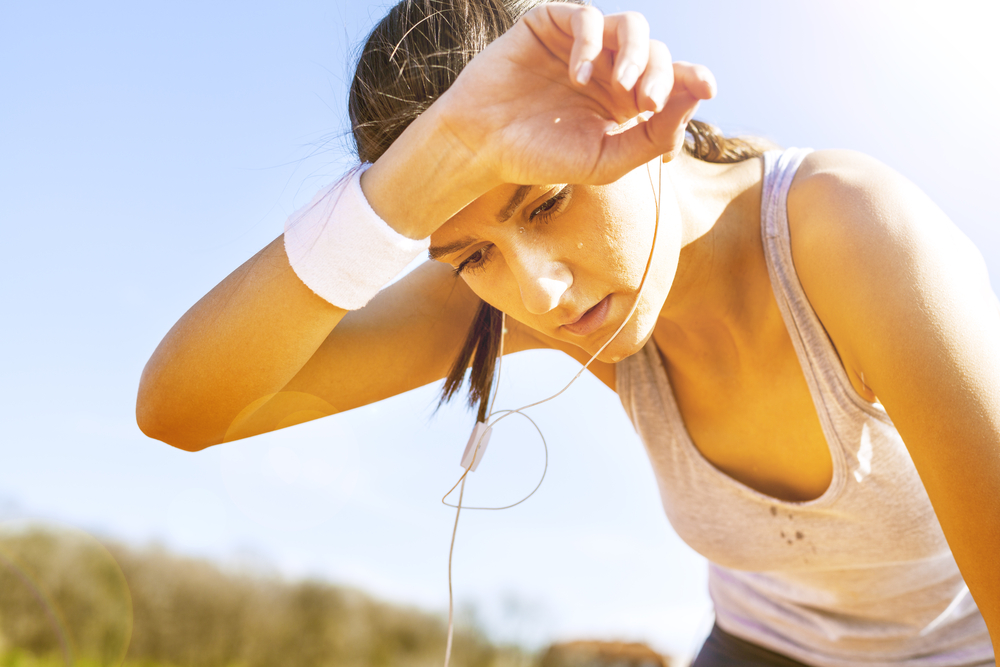
When approached literally, the meaning of perspiration is the process of sweating. And while many individuals may find it somewhat uncomfortable and even embarrassing, perspiration is a key to managing body temperature and staying adequately hydrated. Plus it is also essential for a good workout for athletes.
In other words, the meaning of perspiration is all about temperature control. It is not necessarily bad to sweat a lot when exercising or playing sports as perspiration means that the sweat is helping keep your body cool. During exercise, the amount of sweat pouring out of the body is often greater than the amount of fluids entering the body, leading to dehydration. This process messes with the body’s ability to regulate temperature and that can hurt athletic performance.
What Does Perspiration Mean for Athletes?
Sweating is so much more than losing water from the body and especially in the case of athletes, the meaning of perspiration includes many more facets of the process. Profuse sweating also loses electrically charged particles that help keep water in the right balance inside and outside an individual’s cells.
How much an athlete sweats depends on the number of sweat glands he has and women tend to have more sweat glands than men. However, men’s sweat glands happen to be more active with the results that they tend to sweat more profusely than women.
During moderate to intensive exercise, heart and blood pressure also increase which in turn causes the body to produce more sweat. Additionally, repeated exercises like lifting weights can turn on sweat glands even without raising body temperatures. So perspiration means that even when blood pressure falls after the workout is over, the body often keeps churning out sweat because the muscles stay stimulated.
What Does Perspiration Mean for Non-Athletes?
For individuals who may not have an athletic lifestyle, sweating is still important. For such people, a good amount of perspiration means that in addition to maintaining proper body temperature, toxins are also being expelled from the body. Regular sweating helps achieve this and detoxify the body, helping support proper immune function.
Sweating also kills viruses and bacteria that cannot survive in temperatures above 37 degrees and research shows that in an average healthy individual, sweating leads to a reduction of viable bacteria on the skin surface, reducing the risk of skin infections.
What Does Perspiration Mean in Terms of Dehydration?
One thing that is of the utmost importance for all athletes is that it is essential to drink lots of water before and after a workout. While some individuals can tolerate working out while dehydrated better than others, most individuals who sweat out more than 2 percent of their body weight, also impair their mental advantage and best physical performance, especially if the weather is hot.
If an athlete becomes notably dehydrated and needs to perform again within 12 hours, such as during a triathlon training or tennis tournament, they will need to rehydrate aggressively. Typically, this translates into taking fifty percent more fluids than their sweat losses. Experts recommend drinking fluids slowly for a few hours after the workout since this practice maximises fluid retention rather than take it down in one large drink.
While dehydration is typically associated with the meaning of perspiration, over hydration may also occur. Also known as hyponatremia, the condition results in dangerously low sodium levels in the body by drinking too much water during endurance sports. As a result the sodium becomes diluted in the body, the body’s water levels rise and cells may begin to swell.
Over hydration is very risky and may intensify into seizures, coma or even death. The symptoms can become progressively serious and include discomfort due to headaches, vomiting, swelling in the feet and hands, unwarranted fatigue, confusion and even wheezing.
If an athlete is not a big fan of water, there are other options to stay well hydrated. These include sports drinks which should ideally contain moderate amounts of glucose and sodium rather than sugar loaded sports drinks. These nutrients can help the body speed up rehydration and supply carbs to working muscles for extra energy.
But even among sports drinks, not all drinks hydrate equally. Along with sodium content, some sports drinks also contain a small amount of protein and are believed to hydrate better than conventional sports drinks. The addition of protein to a sports drinks has the potential to increase its absorption rate.
Other Factors Affecting Perspiration
Athletic activity is not the only factor affecting perspiration, meaning that other factors can also contribute to producing sweat. These can include external circumstances like the weather. Because sweating is connected to an individual’s autonomic nervous system, how much they sweat is not within their conscious control. For instance high temperatures while working out will likely increase sweating as the body tries to cool itself down.
Likewise sweating is also associated with certain emotions like stress or anxiety. This suggests that the meaning of perspiration can be linked to greater sweating when taking an important shot while playing basketball or more sweat being produced at a big soccer game; emotions that reflect heighted excitement of some sort.
Dressing inappropriately for an occasion or sport can also be a factor for excessive sweating. Yet, perspiring when you are playing a sport should not be an indicator that something is wrong. However, heavy sweating may be suggestive of heat exhaustion while very little sweating may be indicative of dehydration or heat stroke.